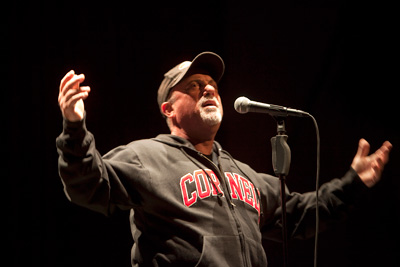'Piano man' Billy Joel is true to form with stories, song and even some Skorton
By Susan S. Lang




In his 2.5-hour Dec. 2 show, the quintessential "Piano Man," Billy Joel, playfully answered some 20 questions from the audience, scurrying between two Steinway pianos to play anything from snippets to full blown renditions of about two dozen songs, from Bach and The Beatles to his own.
The show, "Billy Joel: An Evening of Q and A ... and a little music," in Bailey Hall was sold out earlier this fall via an electronic lottery.
Clad in a black Cornell sweatshirt, baseball hat and jeans, Joel played, sang, shared stories from his life -- and hammed it up. Leaping across the stage as if in a ballet -- despite a double hip replacement he later mentioned -- he wriggled as if washing in the shower and impersonated such musical buddies as Elton John, Ray Charles and Paul Simon (playing chunks of "Still Crazy After All These Years" and "Me and Julio Down by the Schoolyard") and influences James Brown and The Beatles (singing multiple bars from "Abbey Road"). He even played a duet with Cornell President David Skorton.
Joel, 62, a Tony- and six-time-Grammy winner, invited the audience to ask anything about music, songwriting and his life and career path. He said he wanted to give advice, mentioning later he had always wanted to be a teacher, because, he said, when he got started, "there was no book. I needed the information. I made a lot of mistakes, and I'm here to tell the tale."
He implied that he didn't want the kinds of questions he typically got from the press, which "usually asks about Christie [Brinkley], the [three] divorces (including Brinkley) ... depression, drinking." Though, after all, he did work in a piano bar, he said, while waiting for the questions to start. It was only for six months but there were free drinks (and then he played "Piano Man," including the harmonica).
Calling randomly on hands waving in the crowd, Joel answered questions ranging from how he supported himself at the beginning (by pumping gas, landscaping by "hauling trees around," working at an inking factory and on an oyster boat and writing rock criticism) and where he got his song ideas ("by writing for someone I know") to whether he'd go to a sorority formal after the show (no sorry, he said, he would have but he was flying home right after the performance).
He told of his start during high school on Long Island -- roots obvious from his telltale accent -- and how he'd dropped out senior year to commit to music, playing at private parties with mink couches in Queens. During that time, he said, it dawned on him that he was playing for "good fellas." But the money was good, he said.
And so it went. Until around question 14, in response to a query about whether he writes music or lyrics first (almost always music first), he said, "You know, I need the president of the university to help me," and Skorton promptly hopped on stage. Without any ado, Skorton played the flute to "She's Always a Woman" while Joel sang and played the piano.
What is Joel's favorite song to sing? That question prompted Joel to don sunglasses and play "Baby Grand," the tune he wrote for he and Ray Charles to sing together, based on something they had in common.
Joel said he's currently working on instrumentals, which he played a sampling of, and closed the evening with "New York State of Mind" that rendered a standing ovation.
The performance, which was Joel's third at Cornell was presented by the Cornell Concert Commission and the Cornell University Program Board.
Get Cornell news delivered right to your inbox.
Subscribe